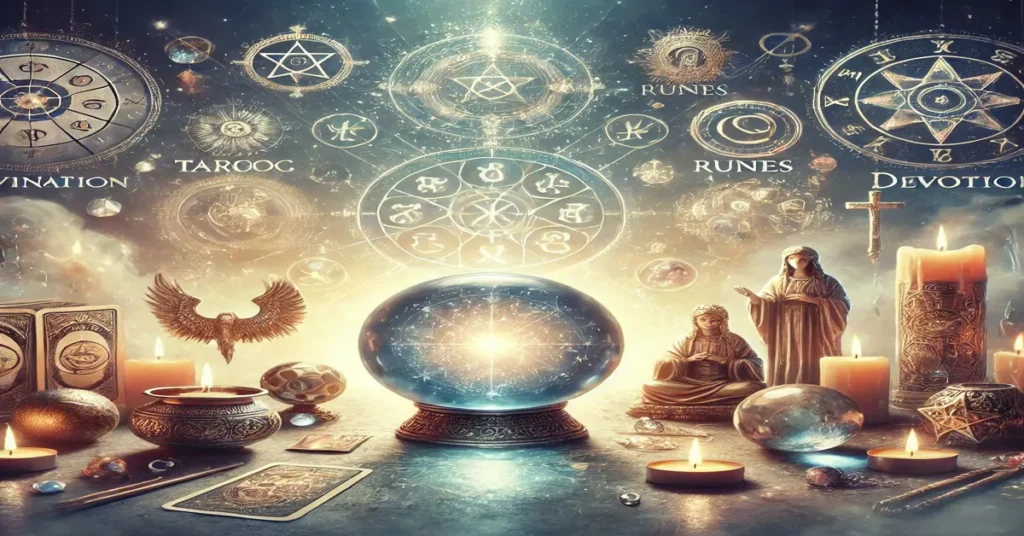Divination and devotion are two distinct yet deeply intertwined aspects of spirituality and religious practices across the world. While divination typically refers to the art of seeking knowledge about the future or hidden things through various rituals, methods, or practices, devotion is often described as a deep, sincere love, loyalty, or worship directed towards a deity, spiritual path, or principle. These concepts, while different in their primary focus, share a common goal—guiding individuals toward greater spiritual insight, clarity, and connection.
In many cultures and belief systems, divination and devotion have played significant roles in shaping personal and collective spiritual journeys. From ancient traditions to contemporary practices, these two elements offer valuable insights into human nature, the divine, and the mysteries of life. This article delves into the concepts of divination and devotion, exploring their meanings, methods, intersections, and impacts on individuals and societies.
Understanding Divination: Origins, Practices, and Methods
Divination is an ancient practice that spans many cultures and religions. It is the act of attempting to gain insights into a question or situation, often involving the prediction of future events, by interpreting signs, symbols, or messages believed to come from a divine or supernatural source. Divination is found in various forms across different cultures, from the ancient Greek practice of oracles to the more familiar tarot card readings in the West.
1. Origins of Divination
Divination has roots in ancient civilizations, where it was seen as a method to communicate with gods, spirits, or ancestors. The practice was closely associated with religious rituals, and diviners were often revered figures in society, believed to have the ability to interpret divine will. Ancient civilizations like the Mesopotamians, Egyptians, Greeks, and Romans used divination as a way to guide kings, armies, and societies in decision-making processes. The desire to understand the will of the gods and the mysteries of fate drove many to seek answers through divination.
In various religious contexts, divination was considered an important spiritual practice. It could offer answers to questions about love, life, death, and the future, helping people navigate uncertainties. Even in modern times, many people continue to seek guidance through various divinatory practices, whether in personal reflection or as part of formal spiritual rituals.
2. Popular Methods of Divination
The methods of divination are numerous and varied, depending on the cultural or spiritual tradition. Some common practices include:
- Astrology: One of the most widespread forms of divination, astrology involves the study of celestial bodies and their influence on human affairs. Astrologers use the positioning of planets, stars, and constellations to predict events and provide insight into an individual’s personality and life path.
- Tarot Reading: Tarot cards are used in divination to interpret the symbolism in the cards and offer guidance on a person’s past, present, and future. The practice is rooted in symbolic imagery and intuition, with readings often focused on emotional or spiritual questions.
- Runes: Originating from ancient Germanic and Norse cultures, rune stones or symbols are used to receive divinatory messages. Each rune carries specific meanings, and their arrangement or casting offers insights into the present or future.
- Pendulum Divination: A practice often used for answering yes-or-no questions, a pendulum is swung over a surface marked with letters, numbers, or symbols. The movements of the pendulum are interpreted as answers from a spiritual source.
- I Ching: The I Ching, also known as the Book of Changes, is an ancient Chinese divination system that involves casting coins or sticks to create a hexagram, which is then interpreted based on ancient wisdom to guide decisions.
- Crystal Ball Gazing (Scrying): This involves gazing into a crystal ball or reflective surface to receive visions or insights into the future. Scrying has a long history, and is often associated with clairvoyance or the ability to see beyond the physical realm.
Exploring Devotion: The Spiritual Practice of Devotion
Devotion, on the other hand, refers to the expression of love, reverence, and worship towards a higher power. It is often an emotional, personal commitment to spiritual practices, whether it be directed towards a specific deity, a set of values, or a spiritual path.
1. The Role of Devotion in Spirituality
Devotion has been an essential component of spiritual and religious practices throughout history. In many religious traditions, devotion involves acts of worship, prayer, meditation, and service. Devotees often seek to cultivate a close, intimate relationship with the divine or the sacred, which is expressed through acts of faith and service.
In Christianity, devotion often takes the form of prayer, worship, and the sacrament of communion, as followers express their love and gratitude towards God. In Hinduism, devotion (referred to as Bhakti) is one of the paths to spiritual liberation, often expressed through singing hymns, chanting mantras, or meditative rituals devoted to gods and goddesses.
In Buddhism, devotion can be shown in various ways, including the act of chanting sutras, meditating on the teachings of the Buddha, and practicing compassion. Devotion in Buddhism is not necessarily towards a god but rather towards the pursuit of enlightenment, truth, and the alleviation of suffering.
2. Acts of Devotion
Acts of devotion vary across traditions and religions, but they all aim to deepen the practitioner’s connection to the divine. These acts often serve as expressions of gratitude, submission, and humility, acknowledging the transcendence of the divine and the importance of spiritual growth. Some examples of acts of devotion include:
- Daily Prayers: Reciting prayers and engaging in spiritual rituals at regular intervals throughout the day.
- Pilgrimages: Visiting sacred sites or holy places as a demonstration of faith and devotion.
- Charitable Acts: Helping others through acts of kindness, as many devotional practices include giving back to the community or helping those in need.
- Meditative Practices: Focusing the mind and heart on the divine through meditation, contemplation, or silent reflection.
The Interconnection Between Divination and Devotion
Although divination and devotion are often seen as distinct practices, there is a significant intersection between the two. Both practices are concerned with seeking a deeper understanding of life, the divine, and the mysteries of the universe.
1. Divination as a Tool for Spiritual Guidance
In many spiritual and religious traditions, divination is used as a tool for guiding one’s spiritual path. For instance, an individual might seek out a tarot reading or consult an astrologer when making important life decisions or when seeking answers to existential questions. This can be viewed as an extension of devotion, where an individual is using divinatory tools to understand their purpose, divine will, or path of righteousness.
In Hinduism, the practice of astrology or consulting gurus is not merely about predicting the future but understanding one’s karma and spiritual trajectory. Similarly, some Christians use scriptural readings or divine signs as a form of seeking guidance from God, which enhances their devotional journey.
2. Devotion and Faith in Divination Practices
Devotion can also play a significant role in the success and interpretation of divinatory practices. Those who are devoted to their spiritual practices or to particular deities may find that their connection to the divine influences their understanding of divinatory messages. Devotion builds trust and faith, which can result in a deeper insight into the readings or visions received.
In the Islamic world, the practice of Istikhara is a form of devotion where one asks Allah (God) for guidance on important decisions, with trust in the divine wisdom and will. The devotion behind this practice is key to the faith placed in the guidance received.
Impact of Divination and Devotion on Individuals and Society
1. Personal Transformation
Both divination and devotion are often catalysts for personal transformation. For many individuals, engaging with divination can lead to new insights and personal growth. It may provide clarity or reassurance during times of uncertainty, leading to a deeper understanding of oneself and one’s spiritual path.
Devotion, on the other hand, is focused on fostering a closer relationship with the divine, which can also lead to personal growth and enlightenment. By dedicating oneself to spiritual practices, individuals cultivate a sense of inner peace, purpose, and connection with something greater than themselves.
2. Building Communities
Divination and devotion also play important roles in the creation of spiritual communities. Whether through shared rituals, collective prayers, or mutual interest in spiritual guidance, individuals who participate in these practices often form strong, supportive communities. These communities can serve as sources of social support, spiritual enrichment, and collective action toward common goals.
3. Cultural Significance
Both divination and devotion have significant cultural impacts. They shape how individuals understand their place in the world, their connection to the divine, and their moral compass. These practices influence art, literature, social norms, and community dynamics, and their presence can be felt in every facet of society.
Conclusion
In conclusion, divination and devotion are profound practices that have shaped spiritual and religious practices for centuries. While divination offers insight into the future and helps guide personal decisions, devotion fosters a deeper connection to the divine, encouraging spiritual growth and personal transformation. The two practices, although distinct, often work in harmony to help individuals understand their place in the universe, make sense of life’s challenges, and ultimately lead more fulfilling, purpose-driven lives.
Through these practices, individuals can embark on a journey of self-discovery, deepen their connection to the divine, and find greater peace, clarity, and understanding. In today’s world, where uncertainty and confusion often abound, both divination and devotion offer pathways to transcend the mundane and connect with the spiritual realm.
FAQs
1. What is the difference between divination and devotion?
Divination is the practice of seeking knowledge about the future or hidden truths through specific rituals or tools, while devotion refers to a deep, sincere love and worship directed towards a deity or spiritual path.
2. Can divination and devotion work together?
Yes, divination and devotion can work together, with divination offering guidance and insight while devotion builds a deep connection to the divine.
3. What are some common forms of divination?
Some common forms of divination include astrology, tarot card readings, runes, pendulum divination, and scrying (crystal ball gazing).
4. How does devotion impact a person’s spiritual life?
Devotion fosters a deeper sense of connection to the divine, encouraging personal growth, spiritual discipline, and the development of virtues like compassion, kindness, and humility.
5. Is divination considered ethical?
The ethics of divination depend on the context and the intent behind the practice. Some people use it responsibly for guidance, while others may misuse it for manipulative purposes.
6. How can devotion lead to personal transformation?
Devotion leads to personal transformation by fostering inner peace, a sense of purpose, and a closer relationship with the divine, often resulting in greater emotional stability and spiritual fulfillment.







